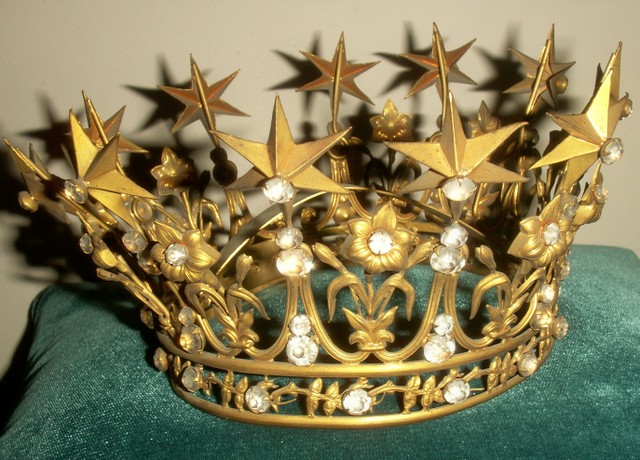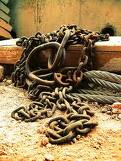
THE YOUTHFUL MARTYR.
IN the days of the young king, Edward VI., a Bible was placed on a desk in every church in England for the use of the people. But when Queen Mary, a stern papist, ascended the throne, she quickly ordered the removal of the Bibles. In a few places her commands were not received, or not obeyed, and so it came about that there still lay the old Bible on a stand just inside the porch of the church at Brentwood, in Essex.
It was in the spring of the year 1555, when a youth named William Hunter entered the church to read the book he loved. He was an apprentice to a London weaver, but was now on a visit to his native town. As he stood reading the holy book, a man of the name of Atwell, an officer of the popish bishop, came that way, and saw him so engaged.
"Why meddlest thou with the Bible?" said the officer. "Knowest thou how to read? And canst thou expound the Scriptures?"
The youth modestly replied, "Father Atwell, I take not upon me to expound the Scriptures; but finding the Bible here, I read it for my comfort."
The officer then began to speak scornfully of the sacred word as a hurtful book.
But as Atwell could not prevail with the lad, he cried, "I see you are one who dislikes the queen's laws. I have heard how you left London on that account; but if you do not turn, you, as well as many other heretics, will broil for your opinions."
"God give me grace," meekly replied William, "that I may believe his word, and confess his name, whatever may come of it."
"Confess his name!" shouted old Atwell. "No, no; you will go to the evil one, all of you."
Atwell quickly left the chapel, and meeting a priest, returned with him to where William was reading; when the priest began to upbraid and threaten him. The youth well knew what this meant; so he hastened to his father's house, and taking a hasty leave of his parents, fled from the town.
A few days after William had gone, a justice sent for the father, and ordered him to produce his son, and upon this errand the poor father was obliged to depart. He rode about for two or three days, hoping to satisfy the justice without finding his son. The lad, however, saw his father at a distance, and went to meet him. On learning the danger of his parent, he said he would return, rather than place his father in any peril.
Early the next morning, William was taken before a justice of the peace, who ordered him to be carried to the old palace in the fields of Bethnal Green, where Bonner, the popish bishop of London, then resided. When he stood in the hall of the palace, the bishop first spoke to him gently, then sternly, and then roughly; but still the youth would not promise to give up the Bible.
"Away with him, then, to the stocks!" cried the bishop.
To the stocks William was hurried. Two long days and nights he there lay, without any food except a crust of brown bread and a small supply of water.
The bishop then sent William to one of the London prisons, with strict orders to the jailer to put as many iron chains upon him as he could possibly bear. And in a dungeon he was confined for three quarters of a year, hoping, trusting, praying always.
Bishop Bonner one day thought of the Bible-loving lad in prison, and sent for him to his palace.
"If you recant," said the bishop, "I will give you forty pounds ($200), and set you up in business." This was a large sum of money in those days, and the offer was very tempting, but it was at once rejected.
"I will make you steward of my own house," added Bonner, in a gentle and crafty manner.
"But, my lord," was the reply, "if you cannot persuade my conscience by Scripture, I cannot find in my heart to turn from God, for the love of the world; for I count all worldly 'things but loss in comparison with the love of Christ."
"Will neither threats nor promises avail?
Then away with him to the fire!"
There was no prison in the little town, so the martyr youth was confined in an inn, and guarded by constables. His mother heard of his return, and with true love rushed to the place where he lay.
And when she found him happy and content, she blessed God for such a son, and the more so when he said: "For the little pain which I shall suffer,
Christ hath procured for me a crown of joy; are you not glad of that, mother?"
They then knelt down, and she prayed to God to strengthen her poor boy to the end.
At length the morning came that William was to die. As the young martyr was led along from the inn, his father rushed forward toward him in agony of parental feeling. Throwing his arms around the neck of his noble boy, he said, with flowing tears, "God be with thee, son William."
The son replied, "God be with you, father; be of good comfort; I trust we shall meet again where we shall rejoice together."
The fire was now lighted; and as the flames began to rise, William, who still held in his hand a book of Psalms, threw it into the hands of his brother, who had followed him to the place of death. His brother, calling to him, said, "William, think on the sufferings of Christ, and be not afraid."
"I am not afraid," replied the martyr. "Lord, Lord, receive my spirit." These were his last words. The fire was lighted; the dry fagots burned briskly; and the flames soon wrapped around his body. In a few moments his sufferings were at an end forever.
Historical Tales.
